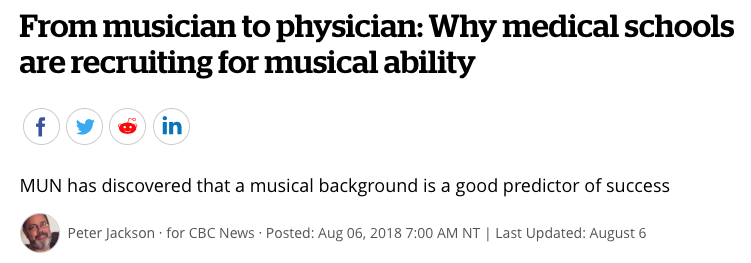A recent CBC news post reveals that Memorial University of Newfoundland (MUN), as well as other Canadian universities, have discovered that a musical background is a good predictor of success for medical students. Why? Constant, continual improvement is central to being a musician and this skill is crucial and transferable for future physicians. The study of music helps the learner to:
- Avoid complacency
- Constantly reassess what you are doing
- Reflect on how to continually get better
Doctors have to continually reflect on how they can improve and continually get better especially if they are surgeons.
This post also confirms the research on deliberate practice by Anders Ericsson. According to Ericsson (2016), deliberate practice is much different than traditional practice because instead of just doing the same thing over and over again the learner focuses on the continual pursuit of personal improvement that is directed by well-defined, specific goals and continuous feedback that drives incremental gains. A skill or ability that a person is working towards is broken down into small enough components where feedback on the performance is used to help the learner make small adjustments that will lead to incremental improvements. The feedback can come from a teacher, mentor, or coach who observes where the adjustments need to be made. The continuous feedback can also come from peers, video, timing devices and other technologies that can provide the learner data that helps map their progress. As the learner gains experience and expertise they can also are able to see where they need to make the adjustments themselves—this is one of the key differences between amateurs and experts.
Another key aspect of deliberate pracitices is that the learner must constantly practices outside their comfort zone. Just far enough to push the boundries but not so far to cause fear and immeidate failure. This is where a few percentage points of pushing the boundry can cointribute the continous incremental gains that are so important to improvement. These incrimetnal gains can add up over time to enable one become an expert. Ericsson’s research into how long it takes one to become an expert was miscontrued and popularized by Malcom Gladwell in his 2008 book Outliers: The Story of Success where he posited the10,000-Hour Rule. Gladwell suggested that the key to achieving world-class expertise in any skill simply practicing the correct way, for a total of around 10,000 hours. Ericsson refuted Gladwell’s claims and pointed out that in some disciplines expertise can be achieved in as short as 5,000 hours and in other,s true expertise is achieved in over 20,000 hours. Furthermore, attaining the level of expertise is only the beginning because the world’s best continue their discipline of deliterate practice throughout their tenure of being at the top of their field. Regardless of how much time is conmitted, the key is deliberate practices with continual feedback that leads toward incremental gains.
Getting back to the story about musicians becoming good physicians because of their ability continually improve it is important for us to understand as educators are that there has to be a purpose for one to commit years of deliberate practice. Whether it is to become a Chessmaster, a world-class musician, a world-class athlete or to be the leader in a particular field the drive toward this end goal only happens if the goal is real world or authentic.
It takes real world or authentic learning opportunities to provide the context for learning and to drive the intrinsic motivation for the learner to persist in making those continuous incremental improvements over time. This is why it is so important as educators to recognize we must not only prepare our learners for the test but we need to prepare them for life. We can do so by creating a significant learning environment in which we give our learners choice ownership, and voice through authentic learning opportunities – the CLSE+COVA framework.
We need to continually ask – are we preparing them for the test or are we preparing them for life.
Additional posts exploring deliberate practice:
References
Ericsson, A., & Pool, R. (2016). Peak: Secrets from the new science of expertise. New York, NY: Eamon Dolan/Houghton Mifflin Harcourt.
Gladwell, M. (2008). Outliers: The story of success. New York: Little, Brown and Co.































